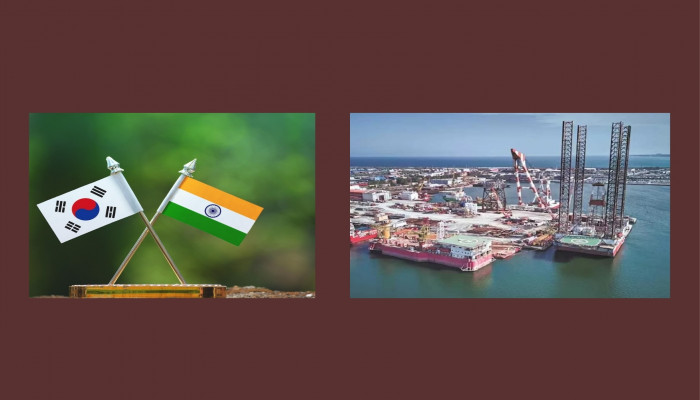India to collaborate with South Korea to bolster shipbuilding capacity
- In Military & Strategic Affairs
- 09:59 PM, Jan 22, 2025
- Myind Staff
India is taking substantial steps to bolster its shipbuilding capacity, aiming to strengthen maritime infrastructure and reduce reliance on foreign shipyards. In line with the Modi government’s vision to position India as a key player in the global shipbuilding industry, the country is likely to collaborate with South Korea to maximise its shipbuilding potential.
Recently, a high-level delegation from South Korea's Hanwha Ocean Co. Ltd., led by Senior Vice President Jin Su Lee, engaged in discussions with representatives from prominent Indian shipyards. These included Cochin Shipyard Ltd., Hindustan Shipyard Ltd., L&T Shipbuilding Ltd., and Swan Defence and Heavy Industries Ltd.’s Pipavav Shipyard in Gujarat. Officials from India’s Ministry of Ports, Shipping and Waterways also participated in these discussions, underscoring the government’s commitment to fostering international partnerships to advance the shipbuilding sector.
South Korea’s shipbuilding industry, a global leader, is primarily dominated by three major shipyards—Samsung Heavy Industries, Hanwha Ocean and HD Hyundai Heavy Industries. In 2024, these shipyards secured significant contracts, with HD Korea Shipbuilding receiving orders for 112 vessels worth $12.1 billion, Hanwha Ocean securing contracts for 26 vessels worth $5.7 billion and Samsung Heavy Industries obtaining orders for 22 vessels valued at $4.9 billion.
India’s collaboration with South Korea gains additional importance as South Korea is a key competitor to China in the global shipbuilding market. China has maintained its dominance in this sector for over a decade. In 2023, China constructed more than half of the world’s merchant ships by gross tonnage, producing 33 million GT, which accounted for 51% of the global total. Additionally, China held 62% of the world’s shipbuilding orders, further highlighting its stronghold on the industry. Partnering with South Korea positions India to challenge this dominance and enhance its own shipbuilding capabilities.
In December 2024, a high-level Indian delegation visited South Korea to explore advanced shipbuilding technologies and capabilities. The delegation included R. Lakshmanan, Joint Secretary of India’s Ministry of Ports, Shipping, and Waterways; Madhu Nair, Chairman and Managing Director of Cochin Shipyard; and Binesh Kumar Tyagi, Chairman and Managing Director of the Shipping Corporation of India (SCI).
During their visit, the delegation toured South Korea’s top three shipyards, including HD Hyundai Heavy Industries (HD HHI) in Ulsan, where they received detailed briefings on the cutting-edge technologies and vast production capacities of South Korean shipyards.
This visit follows Prime Minister Narendra Modi’s 2016 visit to South Korea and underscores India’s growing urgency to expand its maritime fleet. India has an immediate need to acquire 1,000 new commercial vessels, encompassing containerships, liquefied natural gas (LNG) carriers, ultra-large crude carriers (ULCCs), and car carriers, to meet the demands of its expanding maritime infrastructure and global trade aspirations.
The global shipbuilding market was valued at $207.15 billion in 2023 and is projected to grow at a compound annual growth rate (CAGR) of 6.5%, reaching $220.52 billion by 2024. In comparison, India’s shipbuilding market, though smaller, has significant growth potential. Valued at $90 million in 2022, it is expected to expand exponentially to $8,120 million by 2033, reflecting a remarkable 60% CAGR.
To accelerate India’s shipbuilding capacity and enhance repair clusters, the Modi government has proposed the creation of a ₹30,000 crore Maritime Development Fund. This initiative complements the ₹1.5 lakh crore upgrade plan aimed at modernising India’s maritime infrastructure. The comprehensive plan includes the development of six deep-draft ports, two trans-shipment hubs, and the establishment of green and smart ports, positioning India as a competitive force in the global maritime sector.
India currently ranks 22nd in the global shipbuilding industry but has set ambitious goals to enter the top 10 by 2030 and rank among the top 5 countries by 2047. These objectives align with the Modi government’s larger initiatives, such as the Maritime India Vision 2030 and Amrit Kaal Vision 2047, aimed at capturing a significant share of the global shipbuilding and ship repair markets.
India’s collaboration with South Korea has been a key component of this strategy. In 2017, the two nations signed a Memorandum of Understanding (MoU) focused on naval shipbuilding. This agreement included partnerships involving state-owned shipyards like Hindustan Shipyard Limited.
Under the MoU, India and South Korea agreed to jointly produce five Fleet Support Ships worth $1.5 billion and two strategic operating vessels valued at approximately $448 million. These efforts highlight the long-standing partnership and shared vision for advancing India’s shipbuilding capabilities on a global scale.
Disclaimer: The opinions expressed within this article are the personal opinions of the author. MyIndMakers is not responsible for the accuracy, completeness, suitability, or validity of any information on this article. All information is provided on an as-is basis. The information, facts or opinions appearing in the article do not reflect the views of MyindMakers and it does not assume any responsibility or liability for the same.







Comments